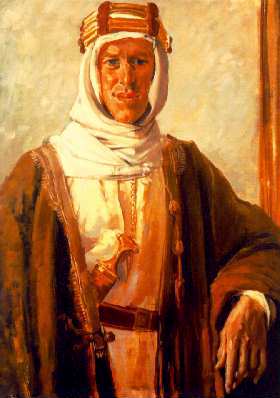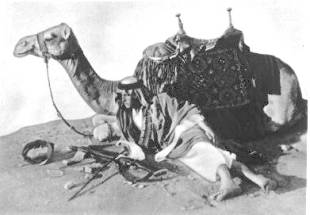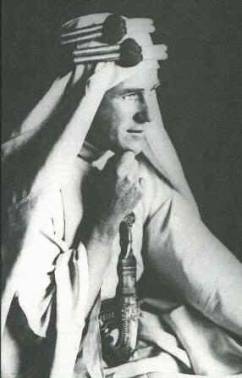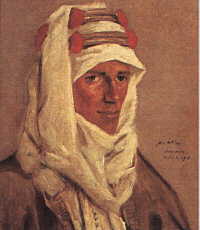|
 While growing up in Pittsburgh, I had many role
models that helped me determine who I wanted to be when I grew up.
Captain Video was one of the first, but soon Tom Mix and the Cisco Kid
replaced him. As I matured, those
preadolescent role models gave way to ones that are more age appropriate.
I can recall being enamored by Lawrence of Arabia and his exploits.
I can remember seeing him riding across the burning desert sands as he
led raids against Turkish garrisons. His
daring and heroism captivated me. When
I became an adult, I read a lot about this Englishman.
While growing up in Pittsburgh, I had many role
models that helped me determine who I wanted to be when I grew up.
Captain Video was one of the first, but soon Tom Mix and the Cisco Kid
replaced him. As I matured, those
preadolescent role models gave way to ones that are more age appropriate.
I can recall being enamored by Lawrence of Arabia and his exploits.
I can remember seeing him riding across the burning desert sands as he
led raids against Turkish garrisons. His
daring and heroism captivated me. When
I became an adult, I read a lot about this Englishman.
Lawrence of Arabia was born Thomas Edward Lawrence in 1888. By the time of his premature death in 1935, he had been an
Oxford scholar, writer of numerous books, archaeologist, negotiator, spy,
guerrilla, saboteur, military strategist, and visionary.
He made his first trip to the Middle East in 1909 when he went there as
an Oxford student to study the architecture of the Crusaders castles in
Palestine and Syria. During his
life, he returned many times to the Arabian Peninsula. Lawrence also worked at various times for the British
colonial office. During World War
I, he was a part of the British Sinai Expedition and was attached to various
Arab tribes that were fighting the Turks.
 Thanks to Lowell
Thomas, T. E. Lawrence became a household name to Westerners.
He was far more than just an Englishman in Arab dress.
He was, for the Arab nations, a rallying point.
At that time, many of them were disorganized and others were under
Turkish control. Lawrence of
Arabia, a Westerner, captured Arab imaginations by his exploits, military
genius, and ability to identify
with Arab people.
Thanks to Lowell
Thomas, T. E. Lawrence became a household name to Westerners.
He was far more than just an Englishman in Arab dress.
He was, for the Arab nations, a rallying point.
At that time, many of them were disorganized and others were under
Turkish control. Lawrence of
Arabia, a Westerner, captured Arab imaginations by his exploits, military
genius, and ability to identify
with Arab people.
Although he believed in a Jewish homeland, he also identified with the
Arab cause. He became so closely
linked with them that he actually took on their concerns.
He became a proponent within the British government for better treatment
of the Arabs. Lawrence thought that
the British colonial government had betrayed the Arabs, and he often took their
side in their disputes with the British's mandate in Palestine and Iraq.
 While this article isn't a discussion about our nation's
Arab‑Israeli position, it is an attempt to understand Lawrence's ability
to identify with an oppressed people. He
identified with the Arab to such extent that he started to think and act more
like them than a British subject. We
do not have to ride into the desert sunset with our caftan blowing in the breeze
to identify with people. However,
we will benefit from Lawrence's desire to identify with those who hurt.
While this article isn't a discussion about our nation's
Arab‑Israeli position, it is an attempt to understand Lawrence's ability
to identify with an oppressed people. He
identified with the Arab to such extent that he started to think and act more
like them than a British subject. We
do not have to ride into the desert sunset with our caftan blowing in the breeze
to identify with people. However,
we will benefit from Lawrence's desire to identify with those who hurt.
We can identify with people whom we may not even know: the homeless, the
oppressed, the poor, and the hurting. As
with Lawrence of Arabia, it can become our cause and mission. We can look beyond
our national boundaries, or we can look to those who are literally right next to
us. It really doesn't matter
where those in need are. What
matters is that we become involved with them and their concerns.
The question, which should be now entering your mind, is how can I
identify with those in need? Allow
me to suggest several ways of doing that. Lawrence
did it by first understanding the needs of the Arabs. He did not merely ride into their villages and say, "Here I
am." He attempted to learn about
them and what was troubling them.
He also visibly
"took on" their identity. In
his case, he physically wore their clothes symbolically saying that he was one
of them. He gave up his Western
clothing, but more importantly, he gave up his Western mindset and became one of
them. It is doubtful that we can do
something as visible, but we can identify with the way that person feels and
thinks. We can "put on" that
person's hurt. If we do, we have
an excellent possibility of truly assisting people in extricating themselves
from their painful problems. Merely
knowing that someone is there who cares can be the secret to that person's
release. This is our responsibility
to help people survive in the depressive deserts of their lives.
We all need role
models for our lives, but we need to move away from those of our childhood.
Role models like Lawrence of Arabia would be a more appropriate role
model for us as adults because they push us to reach out to others in need.

Col. T.
E. Lawrence as painted by James McBey
This
article appeared in the Dixon Telegraph on 3/9/01.
|








 While growing up in Pittsburgh, I had many role
models that helped me determine who I wanted to be when I grew up.
Captain Video was one of the first, but soon Tom Mix and the Cisco Kid
replaced him. As I matured, those
preadolescent role models gave way to ones that are more age appropriate.
I can recall being enamored by Lawrence of Arabia and his exploits.
I can remember seeing him riding across the burning desert sands as he
led raids against Turkish garrisons. His
daring and heroism captivated me. When
I became an adult, I read a lot about this Englishman.
While growing up in Pittsburgh, I had many role
models that helped me determine who I wanted to be when I grew up.
Captain Video was one of the first, but soon Tom Mix and the Cisco Kid
replaced him. As I matured, those
preadolescent role models gave way to ones that are more age appropriate.
I can recall being enamored by Lawrence of Arabia and his exploits.
I can remember seeing him riding across the burning desert sands as he
led raids against Turkish garrisons. His
daring and heroism captivated me. When
I became an adult, I read a lot about this Englishman. Thanks to Lowell
Thomas, T. E. Lawrence became a household name to Westerners.
He was far more than just an Englishman in Arab dress.
He was, for the Arab nations, a rallying point.
At that time, many of them were disorganized and others were under
Turkish control. Lawrence of
Arabia, a Westerner, captured Arab imaginations by his exploits, military
genius, and ability to identify
with Arab people.
Thanks to Lowell
Thomas, T. E. Lawrence became a household name to Westerners.
He was far more than just an Englishman in Arab dress.
He was, for the Arab nations, a rallying point.
At that time, many of them were disorganized and others were under
Turkish control. Lawrence of
Arabia, a Westerner, captured Arab imaginations by his exploits, military
genius, and ability to identify
with Arab people. While this article isn't a discussion about our nation's
Arab‑Israeli position, it is an attempt to understand Lawrence's ability
to identify with an oppressed people. He
identified with the Arab to such extent that he started to think and act more
like them than a British subject. We
do not have to ride into the desert sunset with our caftan blowing in the breeze
to identify with people. However,
we will benefit from Lawrence's desire to identify with those who hurt.
While this article isn't a discussion about our nation's
Arab‑Israeli position, it is an attempt to understand Lawrence's ability
to identify with an oppressed people. He
identified with the Arab to such extent that he started to think and act more
like them than a British subject. We
do not have to ride into the desert sunset with our caftan blowing in the breeze
to identify with people. However,
we will benefit from Lawrence's desire to identify with those who hurt.